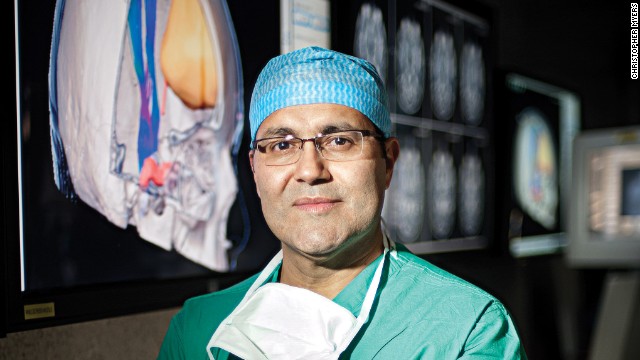
It's an incredible statement from someone who grew up in an impoverished Mexican village, illegally hopped the fence into California, attended Harvard Medical School and now works at Johns Hopkins Medicine as a neurosurgeon.
"I've never been one who declines adventure," he says.
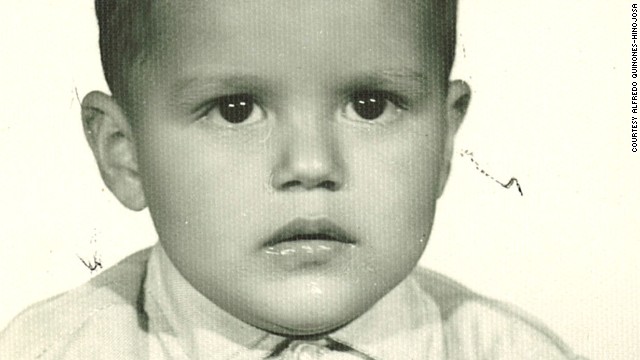 The oldest of five children, Quinones-Hinojosa as a child had nightmares that he had to save his mother and siblings from fires, floods, avalanches, says his memoir, "Becoming Dr. Q," which he co-authored.
The oldest of five children, Quinones-Hinojosa as a child had nightmares that he had to save his mother and siblings from fires, floods, avalanches, says his memoir, "Becoming Dr. Q," which he co-authored.His interest in medicine may have stemmed from this sense of responsibility, along with his baby sister's death from colitis (the memoir is dedicated to her). At 6, though, he wanted to be an astronaut.

The family used to eat meat once a week, but that became a luxury of the past. After the station was sold, they had to make do with flour tortillas and homemade salsa, he wrote.
Short visits to California's San Joaquin Valley, where Quinones-Hinojosa's uncle Fausto was a foreman at a ranch, gave Quinones-Hinojosa a glimpse into the United States -- and the American dream. At age 14, he spent two months there pulling weeds, making money to bring back to his family.
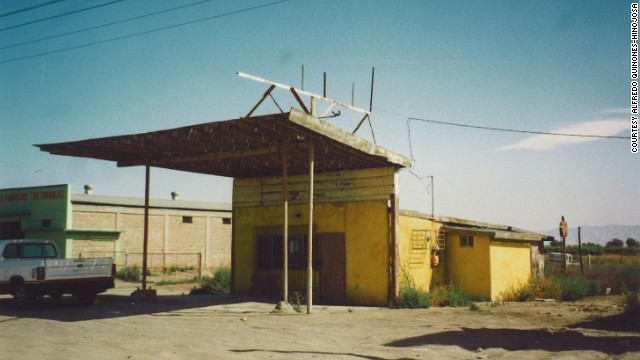
Quinones-Hinojosa's father owned a gas station, which he had to sell because of hard economic times. The family had little money for food.
As a teenager, Quinones-Hinojosa thought he would become an elementary school teacher. Despite his excellent grades at a teacher-training college, however, he was assigned a position in a remote, rural area; only politically-connected, wealthy kids got jobs in cities, he wrote. Quinones-Hinojosa's salary would be paltry.
His uncle agreed to let him work a short stint again at the California ranch to supplement his income, as doubts began to accumulate about his future as a teacher. A plan began to form in his mind.
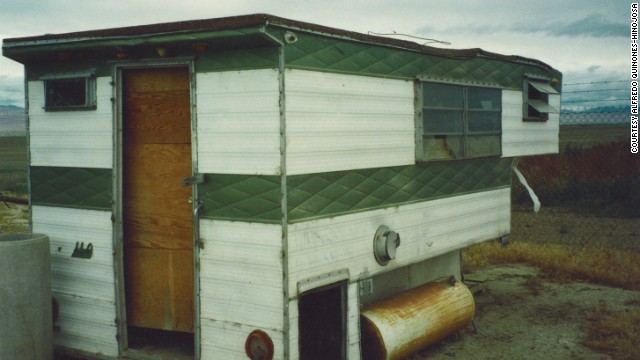
As a migrant worker on a farm in California's San Joaquin Valley, Quinones-Hinojosa lived in this trailer.
Risking arrest, deportation and even death, Quinones-Hinojosa had a plan: He would cross the border in a "Spider-man climb" up an 18-foot-fence, hop over the barbed wire and make a leap into California, he wrote.
Just when he made it across, border agents picked him up and sent him back to Mexico.
Someone else might have just gone home -- but not Quinones. An hour after his attempt, he went back to the very same place to try the exact maneuver again, only faster. This time, he was successful.
With his uncle's assistance, Quinones-Hinojosa ended up back in the fields in the San Joaquin Valley. The vast farming terrain was teeming with corn, grapes, tomato, cotton, cantaloupe, broccoli, cauliflower. He lived in a trailer.
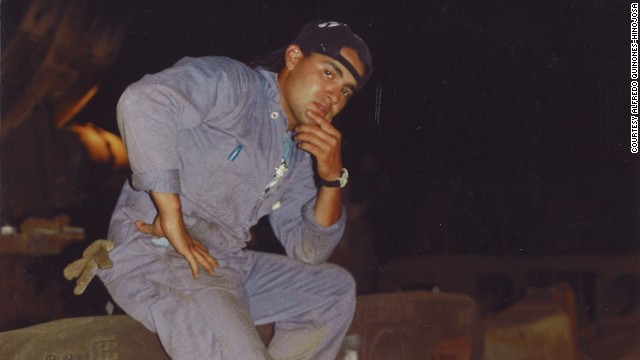
Quinones-Hinojosa moved on from the farm to work as a welder for a railroad company in California. He almost died in an incident involving a gas tank.
Quinones-Hinojosa remembers driving a tractor and seeing agents of the Immigration and Naturalization Service pass by. They would take other workers away, but somehow, he avoided being caught.
Had he been picked up right then, he might not be a neurosurgeon in the United States today. He lets out a laugh at this -- "It's crazy. I never thought about it that way, to be honest with you, but you're absolutely right."
Quinones-Hinojosa had wanted to make enough money for food for his parents and siblings -- who later came to the United States as well -- and intended to go back to Mexico after saving money. "When you're making $3.35 an hour, you realize that that dream is going to take a lot longer," he says.
Next he got a job as a welder for a railroad company. An incident at age 21 almost cost him his life. He was repairing a valve on a tank which previously carried liquified petroleum and, ignoring warnings, went in after a metal nut that tumbled inside.
He was unconscious by the time workers, including his father and brother-in-law, got him out, and woke up later in a hospital. A doctor told him he would have died had he stayed there two minutes longer.
"As if transformed, I no longer cared about the trappings of wealth or dreams of riches that had motivated me before," he wrote in his memoir.
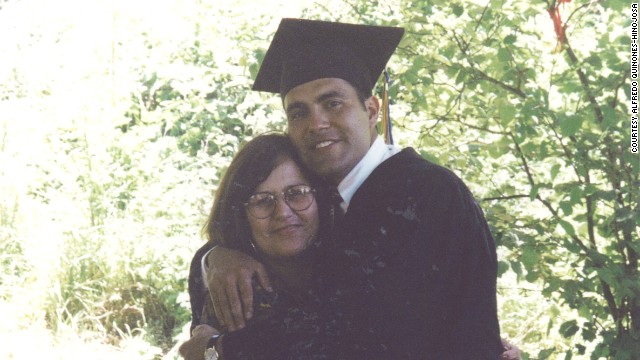
Quinones-Hinojosa attended community college and then finished a bachelor's degree at the University of California, Berkeley. Here, he's with his mother at the Berkeley graduation in 1994.
To his surprise, Quinones-Hinojosa got offers from several universities, he recalls. He chose University of California, Berkeley, because of the scholarship the school offered, but also because he learned it was the epicenter of a social movement in the 1960s. He enrolled at age 23.
But the environment wasn't entirely supportive. A teaching assistant once told him, "You can't be from Mexico. You're too smart to be from Mexico." He said nothing, but the comment stung. These words would later spur him on to prove people like this wrong.
Next stop: Harvard Medical School. When he matriculated, the U.S. population was about 18% minority, but faculty at medical schools was only about 3.7% minorities, Quinones-Hinojosa wrote in an article in the New England Journal of Medicine. While a student, he earned his U.S. citizenship in 1997.
One of his medical school classmates told him no one could pronounce "Alfredo Quinones," and suggested he change his name to Alfred Quinn. Instead, he lengthened his name to Alfredo Quinones-Hinojosa, honoring his mother's family. It was also in medical school that developed the nickname Dr. Q., which is what his patients still call him today.
The brain clearly showed itself as Quinones-Hinojosa's destiny one Friday night in medical school when the hospital was near-empty. A prominent brain surgeon stopped him and asked if he wanted to see brain surgery.
"He goes, 'Let's go right now,' " Quinones-Hinojosa says. "He puts scrubs on me and I walk into the OR to see this magnificent patient that was awake and was being mapped for brain surgery."
Today, Quinones-Hinojosa specializes in the same surgery.
"Alfredo is an outstanding surgeon, and takes very humane and very skilled care of patients with brain tumors," says Dr. Henry Brem, chairman of the department of neurosurgery at Johns Hopkins Medicine. "His mission is to not only deliver the best possible care, but also to do cutting edge research in order to better understand the diseases and to ultimately find better therapies for those diseases."
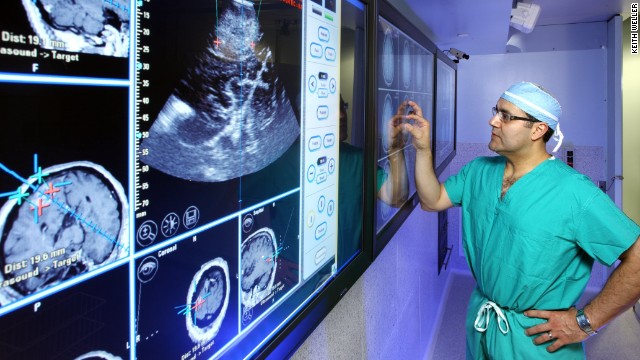
Today, Quinones-Hinojosa is working on a treatment for brain tumors involving stem cells derived from fat cells.
As a migrant farmer, Quinones-Hinojosa's work was full of hazards. With the machinery he operated, a wrong move could mean his finger or hand might be gone; he could even have lost his life. One machine he sat on, for picking tomatoes, he called "the astronaut chair." He had to manage it with both hands and arms.

"All that practice began when I was working in the fields," he says.
Quinones operates on about 250 brain tumors every year. He uses his operating room as an extension of his laboratory. He wants to learn the motor pathways of the brain, what makes the cells "move like spiders" and how to attack them.
He's working on a method to use human fat cells to fight brain cancer. From the fat, researchers derive mesenchymal stem cells, which appear to be effective in identifying cancer.
"It's almost like you give a hunting dog something to smell," Quinones said. "We give the cells the smell of cancer juice and they go back and chase these cancers incredibly well."
You can tell how much Quinones-Hinojosa loves what he's doing now by the way he talks about the brain.
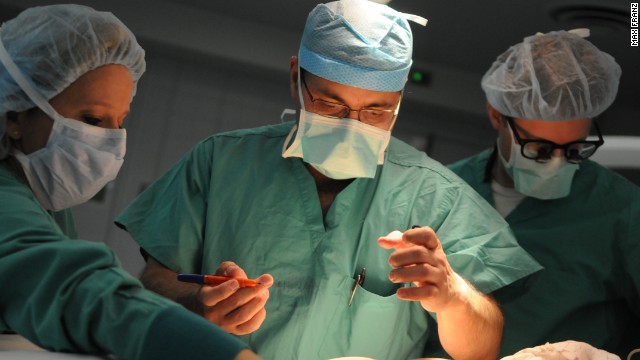
Quinones-Hinojosa operates on about 250 brain tumors every year and uses his operating room as an extension of his laboratory.
Mary Lamb, 56, of Annapolis, Maryland, learned she had large brain tumor -- a non-cancerous meningioma -- in 2008. Nervous about her first appointment with Quinones-Hinojosa, she found him to be "a ball of energy," who was confident that she would be OK.
"He's just so kind and so friendly and he feels like he's somebody that you've known all your life," she said.
The morning of the surgery, Quinones-Hinojosa eased Lamb's fears. "He told me, 'No matter what happens in the rest of the world, I will not leave you, you are my concern,' " she remembers.
Lamb's tumor has not returned, and she organizes fund-raisers for Quinones-Hinojosa's research. The events have raised more than $40,000 in the three years.
"I guess that's the thing that makes him so kind and so compassionate, is where he came from," she said.

There have been so many moments in his life when a combination of luck and determination carried him through. Under different circumstances, he might not have made it.
He's still conscious of the idea of the American dream. He says it was encapsulated by the pride he felt last year when he was an invited speaker at an awards ceremony for middle-schoolers with high GPAs, and got to present an award to his oldest daughter.
"The American dream doesn't mean you have a big house or a fancy car," he said. "That's not the American dream for me. The American dream is the ability to give back when you are so privileged to be able to do what I do. It's: How do you figure out how to give back at least a little bit? That to me is the American dream."
Source: CNN









0 comments:
Post a Comment